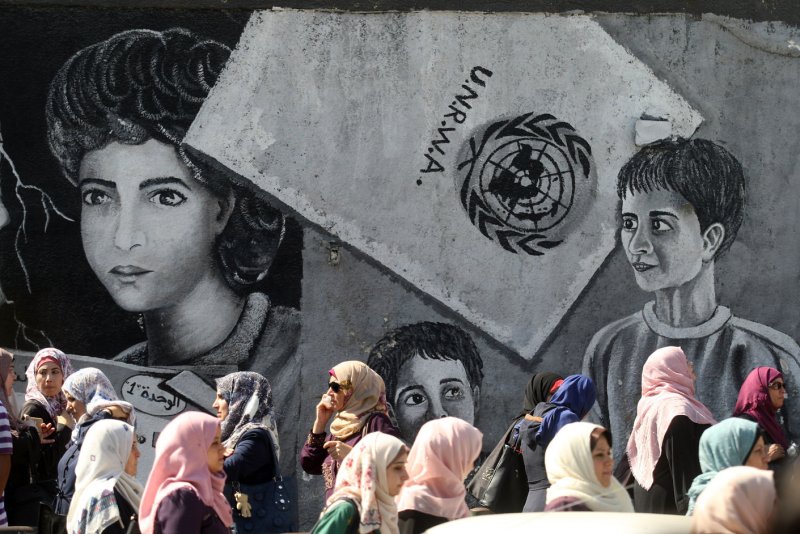The United Nations Relief and Works Agency for Palestine Refugees workers stage a protest on Wednesday in Gaza against austerity measures after the United States cut off funding for the agency. Photo by Ismael Mohamad/UPI |
License Photo
Sept. 25 (UPI) -- A big debate has been going on about foreign aid, namely to Pakistan and to the Palestinian authorities. To many, the aid given to Middle Eastern countries throughout the years has failed to make those countries more stable or more U.S.-friendly.
One major hurdle facing the U.S. government has been corruption in recipient countries. The aid paid from the pocket of the average American taxpayer has not contributed to peace but instead a large part of it has been going toward cronies of corrupt regimes.
One item on President Donald Trump's agenda has been to cut aid. Aid has been cut from $45.2 billion planned by the Obama administration for 2017 to 27.6 billion for 2019. Campaigning on an isolationist agenda under the title of "America first," Trump promised his supporters to cut aid and to direct those funds domestically. However, if the United States wants to remain a superpower, it needs to stay engaged in world affairs. Part of the prosperity that the average American enjoys is because the United States is a superpower.
Also, America is safe when the world is safe. However, military bases around the globe do not do the job alone. Though Trump increased defense spending, more artillery will not make America more secure. Smart and soft power are needed to maintain the United States' leading position in the world. As a superpower, the United States should assume its role in contributing to the prosperity and stability of the world. The question that one might ask: How can the United States use those funds wisely to bring stability and prosperity to those countries? How can the United States circumvent corruption?
Today, the money spent on aid to corrupt governments is a lose-lose situation. The U.S.government loses the money down the drain while it is being used to feed greedy cronies and to increase the government appetite for corruption. In a congressional hearing in December, Michele Dunne, an expert on political and economic change in Egypt, quoted a World Bank report saying that the government is spending its funds on big projects, such as the enlargement of the Suez Canal or the new administrative capital in the desert. Those projects do not create jobs and serve only as a means for the army to make money.
This offers an example in which aid given by the United States is helping inflate the public sector at the expense of the private sector, which contributes to increasing the inefficiencies in the economy. Today, Afghanistan, a country living on American aid, is incapable of sustaining the programs and the basic services that were established in the course of long years of aid.
The right way to go about spending the funds should be to encourage the private sector in these countries to invest in productive sectors that can increase the efficiency of the economy. The United States should invest in factories in countries like Egypt and Pakistan. That would be a win-win situation.
The United States would be directly contributing to betterment of the livelihood of the citizens of those countries while improving its image. Also, advancement of economic conditions and job creation will contribute to fighting radicalization. Here, the United States should use its leverage with those governments to facilitate investment.
The same way corruption eats up foreign aid it hinders private investment. To open a business, a foreign investor usually needs to partner with an affluent person close to the regime in order to get things done. However, the cronies in those governments are less likely to play dirty games when the investor or the entity behind the investor is the U.S. government. Those investments in the long run will bring stability and will contribute to nation building. Part of the allocation of aid funds can be used as tax subsidies for American companies, toward investments in productive facilities in countries the United States wants to help.
In a nutshell, foreign aid throughout the years has not been spent wisely, as it is given directly to governments. In the wake of the Arab uprisings, the United States should have realized that supporting autocratic corrupt governments for decades with aid is a bad idea. The money was only used to enforce corrupt regimes and perpetuate the power structure. This is why aid offered to the government does not mean aid to the people. The funds spent on aid are better used channeled to the grass roots through investing in productive sectors and in job creation.
Dania Koleilat Khatib is executive director of the Al Istishari Al Strategy Center for Economic and Future Studies, a UAE-based independent think tank. She specializes in U.S.-Arab relations and researches sectarianism, extremism and governance. Her book "The Arab Lobby and the U.S.: Factors for Success and Failure" was published by Routledge UK and translated to Arabic.















